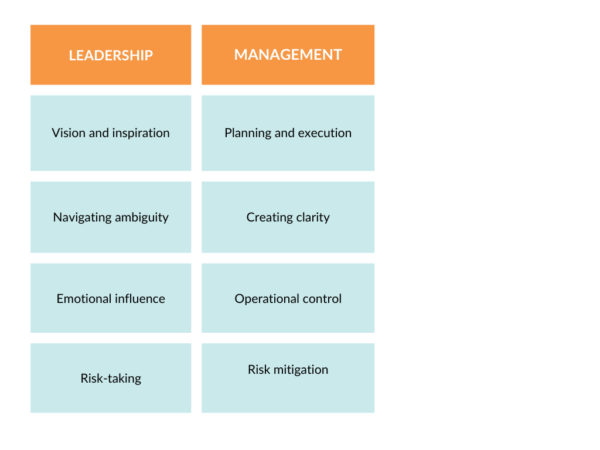Written by Alexandra Mayhew

In independent communications agencies, achieving success depends on more than creativity or flawless execution. It depends on people—and the people who guide them. That’s where the distinction between leadership and management becomes critical.
While the terms are often used interchangeably, they are not the same. One sets the strategic vision. The other builds the systems to make it happen. At IPREX, we see every day that agencies grow faster and operate better when they develop both—good leaders and managers, often in the same person—who understand what each role requires, and when.
Drawing on insights from the first session of the IPREX Academy 2025 cohort, led by Andrei Mylroie of DH and Kathy Tunheim of Tunheim, this post unpacks the key differences between leadership and management, and why building both skillsets is essential for agency professionals around the world.
Defining the Difference: Leadership vs. Management

The simplest way to put it?
Leadership is about people. Management is about process.
Leadership is anchored in vision—the ability to see what’s possible, communicate it clearly, and rally others behind it. A strong leadership style helps people navigate uncertainty and move with purpose.
Management focuses on structure. A manager focuses on building the frameworks, tools, and workflows that make the vision achievable. It’s operational clarity, not just big thinking.
Here’s how they diverge:

Most professionals lean naturally toward one side—but successful leaders in agencies know how to move between the two.
Why It Matters in Agency Life
In an independent agency, the tension between leadership vs. management plays out in real time. There’s no corporate buffer. The client relationship, internal team dynamics, and commercial outcomes often sit with the same individual.
Without leadership, teams lose direction and momentum.
Without management, even the best ideas fall apart in delivery.
A client may be drawn in by your bold vision—but whether they stay often comes down to the strength of your systems. Internally, teams may be motivated by your purpose—but they thrive in well-managed environments that protect their energy and time.
Agencies that invest in leadership skills and management training together—globally and across all levels—build cultures where people and performance can scale.
What the IPREX Academy Teaches
The IPREX Academy’s “Leadership vs. Management” session gave participants practical insight into what these concepts look like on the ground—not just in theory. Here are a few takeaways that resonated across cultures, seniority levels, and agency sizes:

1. Leadership Is Emotional Labor
Leadership isn’t a job title—it’s a daily commitment to show up with intention. That includes self-awareness, emotional presence, and the ability to lead others through change, challenge, and ambiguity.
💡 A leader’s job isn’t to have all the answers. It’s to create clarity, connection, and momentum.

2. Management Is the Invisible Backbone
Successful managers create the conditions for great work: clear timelines, realistic budgets, consistent feedback, and resource allocation. This isn’t just operations—it’s strategic infrastructure.
💡 Without strong management, even the most inspiring work won’t land or last.

3. Leaders Take Risks. Managers Solve Problems.
Managers ask, “How do we fix this?”
Leaders ask, “Is this still the right direction?”
One is about solutioning. The other is about sense-checking the course. Both are necessary—but they demand different instincts.
💡 Courage defines the leader’s job. Consistency defines the manager’s.
4. Leadership Requires Vulnerability
Leaders operate in the open. That includes listening without defensiveness, navigating tough conversations, and moving forward even when outcomes are uncertain. This emotional exposure builds trust and loyalty.
💡 Vulnerability isn’t a liability. For effective leaders, it’s a strategic asset.
5. You Can—and Should—Do Both
You don’t have to pick a side. In fact, you shouldn’t.
A strategist may lead a high-stakes workshop, then manage campaign execution. A client lead may oversee contracts and timelines—then pivot into leadership mode when a tough conversation arises.
💡 Leadership vs. management is not a binary—it’s a balance.
Building Your Own Leadership and Management Skills
Whether you’re entering a leadership position for the first time or evolving your management style, these are skills you can build with intention.
Strengthen Your Leadership:
- Practice casting vision—what’s the “why” behind your work?
- Develop your emotional intelligence—through feedback, reflection, and empathy.
- Lead change—especially when it’s uncomfortable.
- Influence through clarity and connection, not control.
Sharpen Your Management:
- Learn the systems—project management, KPIs, financial tracking.
- Set clear expectations—and follow through.
- Create accountability that feels empowering, not punitive.
- Keep things moving—especially when pressure builds.
Ultimately, the most successful agencies recognize that building both leadership and management capabilities is not just a strategic advantage but a necessity. A strong leader focuses on inspiring their team, fostering a vision, and navigating uncertainty. Leaders inspire by demonstrating how to use resources wisely, guiding their teams with purpose and clarity. Those who step into leadership roles with intentionality not only strengthen their agencies but also cultivate environments where strong leaders emerge and thrive
How This Shows Up in PR & Communications Agencies
At IPREX, we’ve seen how the balance between leadership and management plays out differently across markets—shaped by client expectations, cultural dynamics, and agency structures.

- In Europe, where many agencies operate in highly regulated, mature markets, successful leaders often focus on strategic innovation—guiding clients through complex brand transformations or ESG commitments—while also managing across distributed teams and multilingual workflows to meet strict timelines.

- In Latin America, where client relationships are deeply personal and often long-standing, a team lead may manage complex stakeholder groups and budget constraints, while also leading with empathy and adaptability during moments of political or social tension—especially in high-pressure public sectors.

- In Asia-Pacific, particularly in markets like Singapore, Australia, and Japan, the best agencies often blend leadership qualities like long-term vision and cultural sensitivity with strong operational discipline. Here, an account director might need to lead across culturally diverse teams while managing high client expectations in competitive, fast-moving industries like tech or finance.

- In Africa, where agency teams are often lean and fast-scaling, leadership means fostering a company culture that prioritizes both innovation and inclusivity—while management focuses on building scalable systems to support growth across vastly different media and regulatory landscapes.
In every region, we’ve seen that the agencies that invest in developing both leadership and management capabilities are the ones that retain talent, earn trust, and grow sustainably—regardless of geography.
If you’d like to learn more about the African landscape, see our article, Africa’s PR Playbook.
If you’d like more data about regional breakdowns, see our Global Report on The State of Communications & Marketing.
What the IPREX Academy Is Doing Differently
The IPREX Academy is designed to help agency professionals around the world develop both sets of skills—with the confidence to know when to use which.
Through coaching, peer exchange, and applied learning, participants explore how their own instincts, leadership style, and agency context affect their work. This isn’t abstract theory. It’s focused professional development that builds capability—today and long-term.
Growing Leaders Who Grow Agencies

The IPREX Academy isn’t just a course—it’s a global learning experience shaped by the realities of agency life. Leadership and management are just the beginning.
This year’s curriculum also explores:
- Strategic thinking and the role of AI
- Business development in competitive markets
- Financial management for agency sustainability
- Navigating personal saboteurs and leadership mindset
- Embedding global diversity into agency culture
For independent agencies, that kind of growth support is rare. But at IPREX, it’s built into the network.
If you’re running an agency and want to invest in your people, expand your global perspective, and access the kind of practical learning that drives performance—IPREX was built for that.
Learn more about joining IPREX.
This article was created with the assistance of AI tools.




